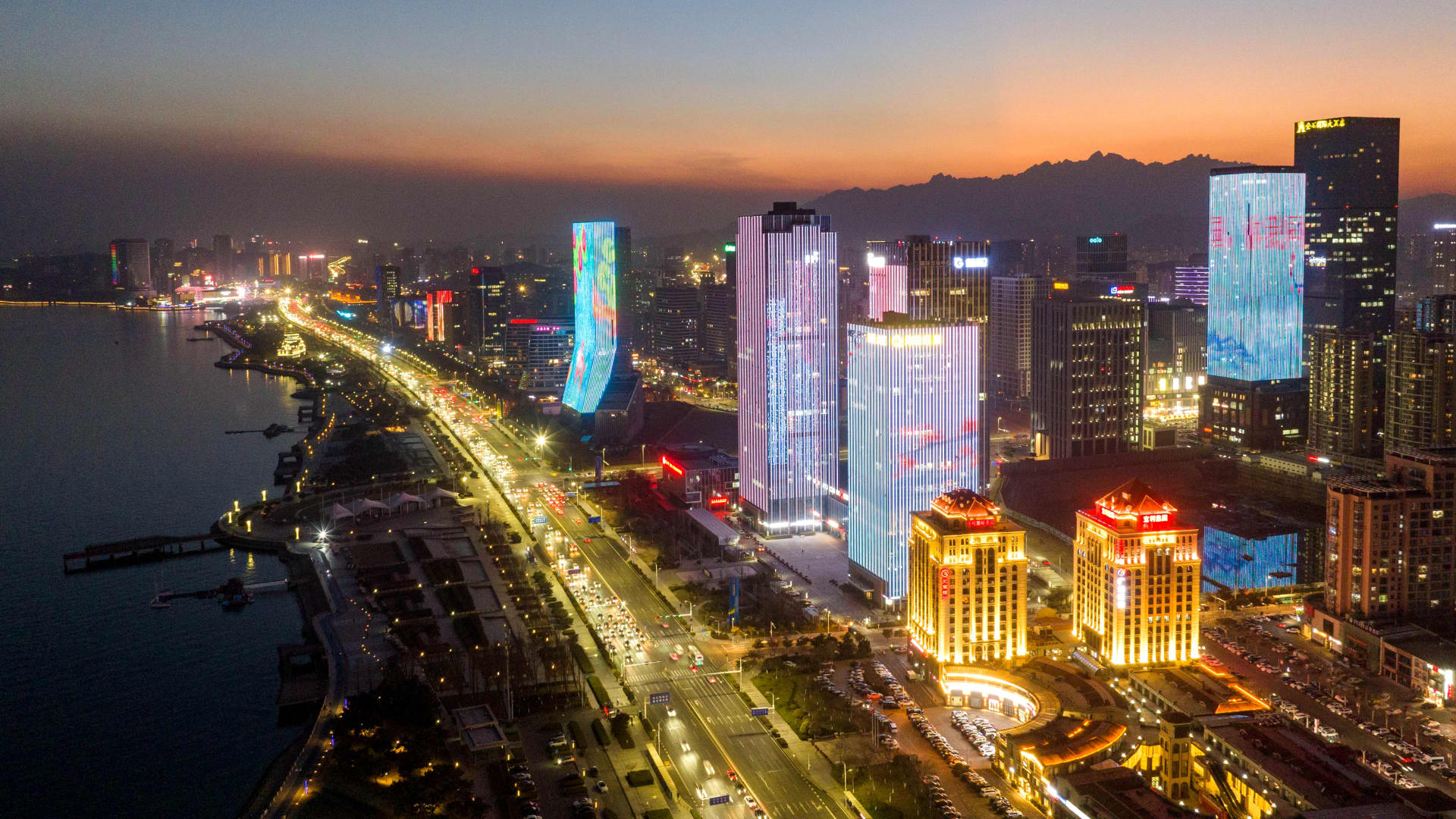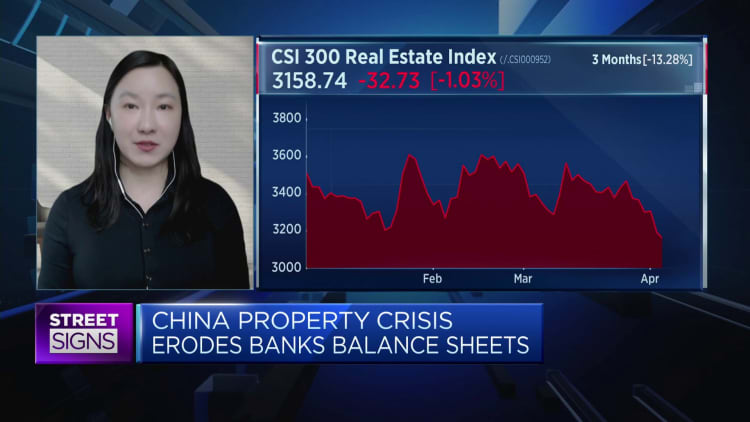
On March 22, 2024, high-rise buildings in the West Coast New District of Qingdao City, East China’s Shandong Province, lit up at night.
Noor Photos | Noor Photos | Getty Images
Embargoed until Thursday 4 April 2024 at 8am
BEIJING – China’s real estate problems may be far from over and industrial problems need to be resolved quickly if overall GDP growth is to pick up significantly, a report released by global investment firm KKR said on Thursday.
That was one of two key takeaways from a recent visit to China by Henry H. McVey, the firm’s head of global and macro asset allocation. This is his fourth visit in just over a year.
“The fundamental overbuilding in the real estate industry needs to be addressed, and it needs to be addressed as soon as possible,” he said in the report. One of the co-authors of the report is Hua Changchun, chief economist for KKR Greater China.
“Secondly, confidence must be restored to reduce savings,” McVeigh said, noting that this would incentivize consumers and businesses to spend money to upgrade to higher-quality products, as advocated by Chinese authorities.
Real estate and related industries once accounted for about a fifth of China’s economy or more, depending on the breadth of analysts’ calculations. The real estate industry has been in a slump in the past few years after Beijing cracked down on developers who relied heavily on debt to grow.
KKR reported that compared with the real estate corrections in the United States, Japan and Spain, China’s “real estate market adjustment may be only half complete.”
“Both prices and sales will have to come under pressure to complete the cleaning cycle,” the report said. “So far, though, this has largely been a contraction in volume.”

Although KKR’s report did not provide many details on specific real estate policy expectations, the authors said that more actions taken by Beijing to improve China’s real estate industry “could significantly change investor perceptions.”
Against the backdrop of geopolitical tensions, China’s real estate market collapse and stock market decline have made many foreign institutional investors hesitant to invest in China.
KKR reported: “Based on some of our proprietary survey work, many allocators have considered reducing China exposure to 5-6% from the current 10-12%, and we believe economic fundamentals may have bottomed.”
Most of China’s official data at the start of the year exceeded analysts’ expectations.
Chinese officials say the real estate sector remains in a period of adjustment, while Beijing shifts its focus to manufacturing and so-called “high-quality development.”
Authorities have also issued policies to promote financial support for specific property developers, while many local governments (though not necessarily the largest cities) have also significantly relaxed home purchase restrictions.
Real estate drag eases
KKR predicts that China’s GDP growth will slow slightly to 4.7% this year and 4.5% next year, and that the drag on the economy from real estate and COVID-19-related factors will be halved, from 1.4 percentage points in 2024 to 2025. 0.7 percentage points.
“Our bottom line is this: With the continued correction (in real estate) and some potential further policy support, we think the drag on the overall economy should ease in the coming years,” McVeigh said in a separate statement. He is also the chief investment officer of KKR’s balance sheet.
The report said that in the next two years, the contribution of catering, accommodation and wholesale to growth will increase slightly, while digitalization and the shift to carbon-neutral and green industries are expected to remain the largest growth drivers.
For investors, the report said a more important development than China’s GDP growth is whether authorities can make it easier for companies and households to access capital markets.
“Repairing weaknesses in the economy, particularly in housing, will ultimately raise the cost of capital and will also allow new consumer companies to enter the capital markets at better prices if real estate and confidence perform better,” McVeigh said. statement.
In March, Beijing announced a GDP growth target of about 5% this year.Ministry of Housing and Urban-Rural Development Minister Ni Hong said last month that developers Bankruptcies should be made if necessary and the authorities will promote the development of affordable housing.
Recent data suggests the real estate sector’s slowdown is stabilizing. Nomura Securities quoted data from Wind Information as saying that as of Monday, the seven-day moving average of new home sales in 21 major cities fell by 34.5% year-on-year, which was better than the 45.3% decline a week ago.
Average sales fell just 27.8% as of Monday compared with the same period in 2019, compared with a 47% drop a week ago, Nomura said, noting that most of the improvement occurred in China’s largest cities.
Consumer Outlook
KKR said that most of its local investment portfolio is concentrated in consumer and service companies, and the businesses of these companies reflect how Chinese people in the middle and upper income classes upgrade their lifestyles through moderate consumption.
“Revenue growth is solid, profit margins remain unchanged, and consumers are purchasing less high-profile items such as ‘smart homes,’ pets and entertainment activities,” the report said. “Domestic travel is also strong.”
In the longer term, KKR still expects China to follow historical precedent and change policies to be “more investor-friendly.”
The report states: “While our message is not a clear signal, history is our guide and it serves as a reminder that if China does adjust its domestic policies to make them more investor-friendly (particularly related to supply-side reforms) , this market could rebound significantly from current levels.”


